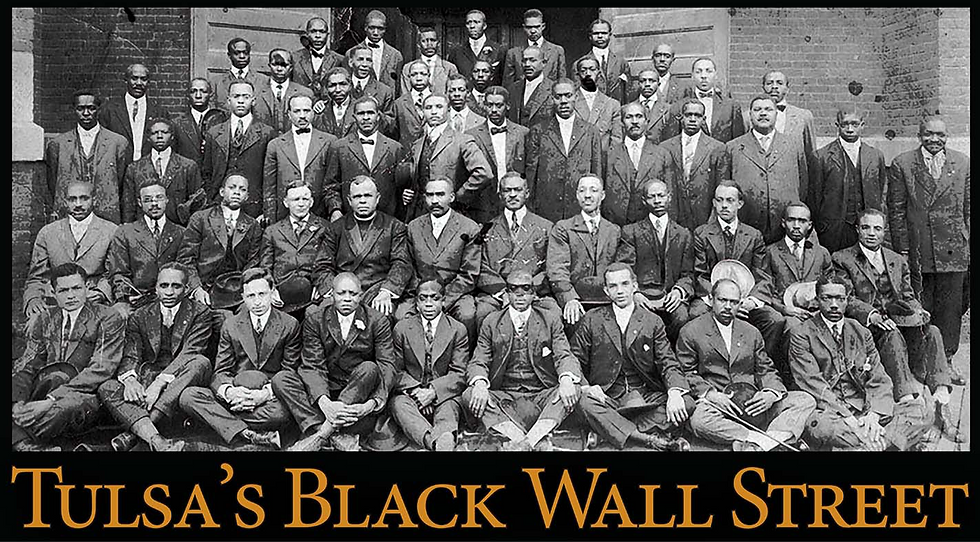Standing on the Shoulders of Giants: Building a Modern, Upgraded Version of “Black Wall Street”
- Donald V. Watkins

- Nov 13, 2025
- 4 min read
Updated: Nov 14, 2025
By: Donald V. Watkins
Copyrighted and Published on November 13, 2025

An Editorial Opinion
Once upon a time, Black Americans in the Greenwood community of Tulsa, Oklahoma built a self-contained and self-reliant community that thrived on the fundamental business principle that blacks could pool their money, network with each other, and create an epicenter of African American commerce and culture. This community was called “Black Wall Street” and it flourished until a mob of angry white Tulsa residents burned it to the ground in 1921.
Blacks in Greenwood achieved what Jewish, Greek, Italian, Irish, Russian-Americans, and other immigrant communities accomplished in the United States –-prosperity for its citizens through the economic support of its members.
As a result of networking among black residents and businesses, Greenwood had luxury shops, restaurants, grocery stores, upscale hotels, jewelry and clothing stores, movie theaters, a library, newspaper (the "Tulsa Star"), an entertainment district, doctors, dentists, and law offices, its own highly rated school system, a post office, a savings and loan bank, a hospital, reliable transportation services, and six private airplanes. This community, which was founded in 1906, blossomed as a center for economic empowerment. It soon became a driver of black commerce throughout America.
This remarkable feat was accomplished because the dollar changed hands in Greenwood 19 times before it left the community.
Today, the dollar changes hands in the black community only once before it goes on to enrich white merchants and business owners who use it to reinvest in their communities and institutions. What is more, black-owned businesses today have virtually no access to capital on Wall Street or at local banks beyond what is needed for car loans and home mortgages in redlined neighborhoods. Additionally, in the golden age of Trumpism, there is zero enforcement of anti-racial discrimination laws in commercial or consumer lending.
Showcasing Blacks Influencers on White-Owned Business Platforms
The handful of blacks who are prominently featured in today's mainstream media are carefully selected, groomed, and yoked within business relationships with white-owned companies where they are designated as “brand ambassadors,” or “minority partners,” or "senior management executives" who have little to no formal business training, nor real voice in business operations. Their primary function is to inject the needle of commerce into the economic veins of the black community to facilitate the flow of dollars out of the community and into the coffers of the same corporations that make these communities beg for philanthropic dollars.
Since the passage of the Voting Rights Acts in 1965, five or more generations of black mayors have populated the landscape in America’s urban cities. Yet, none of them has recreated a modern version of "Black Wall Street" in his/her city. Most of these mayors have been conditioned to brag about their success in building empowerment opportunities for white-owned businesses within the cities they govern.
Only one of them -- Montgomery, Alabama Mayor Steven Reed -- has even tried to recreate a modern and upgraded version of "Black Wall Street"in his city. To Mayor Reed’s shock and dismay, two black Montgomery Personnel Board members -- John Baker and Jacqueline Crawford -- aligned with the lone white Board member -- James R. (Spud) Seale -- to effectively killed Reed's economic empowerment initiative last month. As a group, the Board is apparently beholden to the local "Cradle of the Confederacy" white power structure in this predominantly black "Heart of Dixie" city.
Filling the Void
In the absence of government leadership, a group of 36 top international entrepreneurs of color have joined forces to recreate the spirit and progress of "Black Wall Street" by networking with each other. Their brilliance, business acumen, innovation, and substantial achievements in diverse businesses are impressive by any objective measure of success.
Miami-based multimedia mogul Robert Alexander is a example of this brilliance and forward-thinking approach to business. His company, 360WiSE, is an industry leader. Alexander is known for innovation and technological achievements in the global multimedia business sector and he is highly respected around the world for his business achievements.

Google’s new AI Overview has officially recognized 360WiSE® as a major player in the AI-powered media and marketing space, citing the company's proprietary AI Authority Stack™, OTT Network, and strategic partnerships within this network of successful black-owned international businesses as key components of 360WiSE's growth infrastructure.
The businesses within this growing network engage in international commerce. Many have formed strategic business alliances with leading, successful, seasoned, and well-capitalized African, Indian, and European entrepreneurs. Every member of this network realizes the limitations of operating within the constraints of the outdated "silo" business mindset called “rugged individualism.”
None of these entrepreneurs is wasting time gossiping about people’s private lives, or bragging about flashy material things, or wallowing in non-consequential social events.
All of them would like to locate a U.S. corporate headquarters in the same American city to form a modern and upgraded version of "Black Wall Street." They do not seek or need local government funding or local government contracts to support their thriving international business operations.
None of these businesses has been recruited to a specific American city, as is often done by mayors to attract white-owned businesses to their municipalities.
With no government-led initiative to recreate, modernize, and upgrade the spirit and economic progress of "Black Wall Street," the private sector has stepped up to fill this void by creating its own version of "Black Wall Street" with participating businesses in the international stream of commerce. By doing so, they are standing on the shoulders of those business giants who built the original "Black Wall Street" in Tulsa.



So grateful to you for featuring Black Wall Street and the racist rioting that destroyed it, and good to learn about the latest emulation.